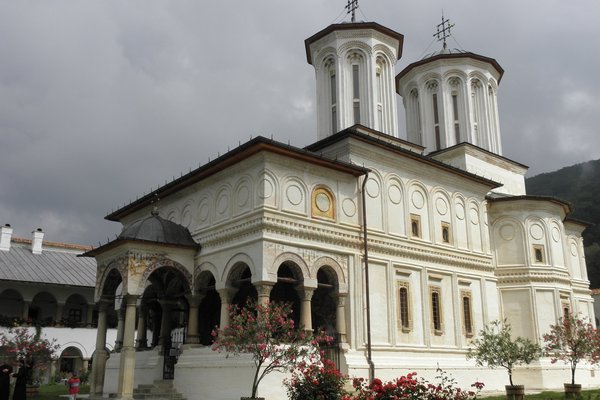Romania
Monastery of Horezu
The Monastery of Horezu is considered the masterpiece of the Brancovan style that influenced art across the region in the 18th and 19th centuries.
The monastery was founded in 1690 by Prince Constantin Brancovan, who let it be adorned with wall paintings and other rich decorations. The Brancovan style that developed under these circumstances is a synthesis of Byzantine and Northern Italian Renaissance architecture.
Community Perspective: it nowadays is in use as a nunnery, but can be visited freely. Behind the main church, through the gate and up the hill, there's another small chapel covered in paintings that should not be missed.
Site Info
Official Information
- Full Name
- Monastery of Horezu (ID: 597)
- Country
- Romania
- Status
-
Inscribed 1993
Site history
History of Monastery of Horezu
- 1993: Inscribed
- Inscribed
- 1991: Referred
- Bureau - pending better protection. Mission to be sent to Romania to help
- Type
- Cultural
- Criteria
- ii
Links
- UNESCO
- whc.unesco.org
- Official
-
- romanianmonasteries.org — Romanian Monasteries
All Links
UNESCO.org
- whc.unesco.org — whc.unesco.org/
Official Website
- romanianmonasteries.org — Romanian Monasteries
Community Information
- Community Category
- Religious structure: Christian
Travel Information
Recent Connections
-
Free entrance
-
Total Solar Eclipse since Inscription
11 August, 1999 -
Nunneries
(active)
Connections of Monastery of Horezu
- Geography
- Trivia
-
-
Modelled after
After Mount Athos -
Total Solar Eclipse since Inscription
11 August, 1999
-
- World Heritage Process
-
-
Inscribed on a single criterion only
ii. to exhibit an important interchange of human values, over a span of time or within a cultural area of the world, on developments in architecture or technology, monumental arts, town-planning or landscape design
-
- Religion and Belief
-
-
Nunneries
(active)
-
- Constructions
-
-
Loggia
Dionysos-Loggia
-
- WHS on Other Lists
-
-
European Destinations of excellence
Lies within the Horezu Depression (2008)See ec.europa.eu
-
- Timeline
-
-
Built in the 17th century
founded in 1690
-
- Visiting conditions
News
No news.
Recent Visitors
Visitors of Monastery of Horezu
- Afshin Iranpour
- Alberto Rodriguez Gutierrez
- alex
- Alexander Barabanov
- Alexander Lehmann
- Alex Marcean
- A. Mehmet Haksever
- Ana
- Anna Wludarska
- Argo
- ArnaudFilloux
- Aspasia
- Atila Ege
- BaziFettehenne
- Bin
- Bodil Ankerly
- Boj
- Brendan Carroll
- Cezar Grozavu
- Christoph
- Clyde
- Cody Ayers
- Cristina Erba
- Dagmara
- Dan Pettigrew
- DavidS
- Dimitar Krastev
- Elaine McArdle
- Elia Vettorato
- Els Slots
- Erik Jelinek
- Eva Kisgyorgy
- Evgenii
- Fan Yibo
- Feldhase
- FS
- George Gdanski
- GeorgeIng61
- Gernot
- Harald T.
- Harry Mitsidis
- Iain Jackson
- Ivan Rucek
- Jakob F.
- Jakubmarin
- Janos
- Jarek Pokrzywnicki
- Jasam
- Jeanne OGrady
- Jezza
- Joebobs
- Joel on the Road
- John Smaranda
- Jonas Hagung
- Jonas Kremer
- jonathanfr
- JoStof
- Joyce van Soest
- KarenBMoore
- Karito Vies
- KentishTownRocks
- Kurt Lauer
- Lisu Marian
- Lucas Del Puppo
- Luis Filipe Gaspar
- Maciej Gil
- Malgorzata Kopczynska
- Małgosia Łupicka
- marcel staron
- Martina Rúčková
- Mihai Dascalu
- Mikko
- nan
- Nihal Ege
- Patrik
- Paul Schofield
- petar
- Petri Jurescu
- Philipp Leu
- Philipp Peterer
- Piotr Wasil
- Rafał Kałczuga
- Ralf Regele
- Randi Thomsen
- Remigiusz
- Roger Ourset
- Roman Bruehwiler
- Roman Raab
- Sabrina Liebehentschel
- Schnitzel
- Sergio Arjona
- Shandos Cleaver
- Slavi
- Solivagant
- Stanislaw Warwas
- Stijn
- Svein Elias
- Szucs Tamas
- Taotao Chen
- Tarquinio_Superbo
- Tatiana Nikulnikova
- Tevity
- Thomas Buechler
- Thomas van der Walt
- triath
- Tsunami
- Twobaconsandaboston
- Vanessa Buechler
- WalGra
- Wojciech Fedoruk
- Wo_ko
- Yevhen Ivanovych
- Zoë Sheng
Community Reviews
Show full reviews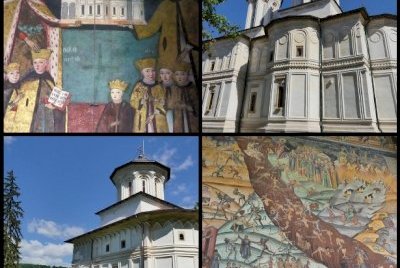
I visited this WHS in 2023 as a half day trip together with the 2 nearby culas (tWHS). Knowing that the site was free of charge, I obeyed the sign stating that no authorised vehicles should enter beyond the sign, meaning an extra kilometre or so of walking from the main gate to the walls surrounding the monastery. On my way back, being the only tourist around, I noticed that practically all the locals disregarded this sign and parked just before the gate giving direct access to the monastery.
The monastery is still an active one, and apart from the usual daily activities done by the nuns, such as praying, washing clothes, gardening, cleaning, etc, I also witnessed them milking the few cows grazing around the monastery perimeter as well as the selling (and subsequent slaughtering) of a lamb for the nun's next dinner or lunch. During lunch time, most nuns seemed very busy so I could walk around freely both next to the church facade and inside the church proper to take photos without flash, even though strictly speaking this is not allowed.
The Horezu or Hurezi Monastery was founded in 1690 by Prince Constantin Brancoveanu in the small town bearing its name in Wallachia, Romania. It is considered to be a masterpiece of the "Brancovenesc style", known for its architectural purity and balance, the richness of its sculpted detail, the way religious compositions are treated, its votive portraits, and its painted decorative works. Having visited several …
Keep reading 0 comments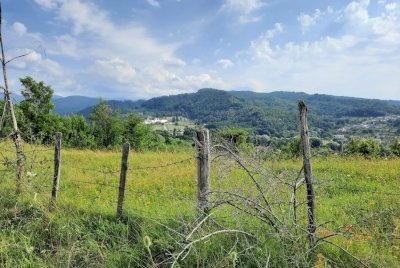
On my way from Transylvania to Bucharest, I visited the Monastery in Horezu. I had stayed over night in Targ Jiu and hopped a minibus direction Bucharest, getting off at Horezu. From the Horezu bus station, I walked uphill to the monastery.
It's now more than half a year that I visited. And frankly, nothing really stuck with me. I guess, you can see that it's a rather modern interpretation of an old pattern. It was built in the 17th century and clearly copies medieval Greek orthodox monasteries, e.g., Athos. It lacks a unique Romanian touch. Personally, I found the churches in Northern Romania significantly more impressive.
As mentioned in Els summary text, the inscribed property covers more than the main monastery. Due to bad planning/research I missed it. I saw a very nice picture from Samuel of (I think) Schitul Bolniţa. It's located to the right of the entry. There are also some buildings behind the monastery. It's not well signposted, as far as I could tell, so just snoop around.
Getting There
There are direct buses from Targ Jiu via Horezu to Bucharest. The next larger town is Râmnicu Vâlcea and there are local buses making the connection between Horezu and Râmnicu Vâlcea. Note: The local buses are really slow and do a huge detour through the country side.
The Horezu bus station is a bit outside of the city center at DN65. Don't expect much at the bus station. Upside: It's closer …
Keep reading 0 comments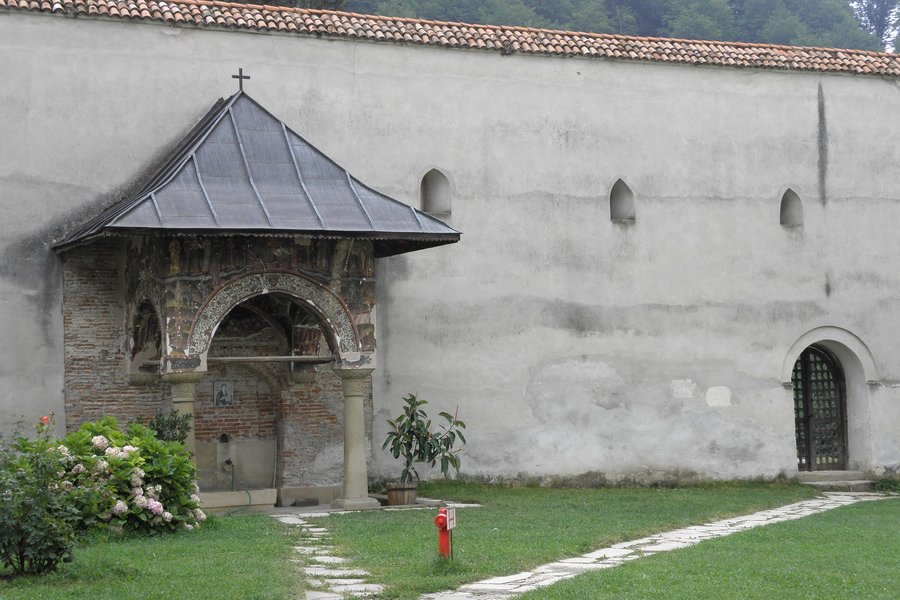
Horezu was our first visit in Romania, and our first encounter with an Orthodox monastery since focusing full-time on World Heritage sites. It's quite an enjoyable site - the walls hiding a brightly-painted Katholikon surrounded by flowers. The portico and interior of the church are both covered with bright paintings done in the "Brâncovenesc style", considered to be the only original Romanian art form. Unfortunately we couldn't film inside, but managed to get some fantastic shots on the portico.
Make sure you head out behind the main church, through the gate and up the hill. Here there's another small chapel covered in paintings, and you can really see how much of the monastery's original outer wall has been destroyed.
Keep reading 0 comments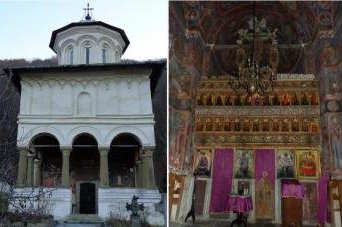
I visited the Monastery of Horezu WHS at about 8.30 on a Wednesday morning in early January 2017 by a rental car.
Anybody was able to enter the monastery compound freely for free at that time.
There was some sort of service going on in the main church of the monastery, in which photo is not allowed even without flash.
I walked around the compound to find a small chapel (photo left) further up the hill.
The entrance had double doors, a grill door first and a wooden door second. The grill door was locked, so I could not enter. But the wooden door was open, so I could see what's inside through the grill door. There was no sign for no photo, so I was able to get a snap of the interior (photo right).
Keep reading 0 comments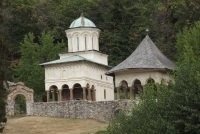
This monastery is attractively located in the hills 4km north of Horezu village. Els' pictures accurately depict the buildings and frescoes, but I liked the small chapel beside the cemetery.
I reached the site by taxi from the bus station in the village. Buses link the village with railway stations at Petrosani, Craiova and Ramnicu Valcea.
Keep reading 0 comments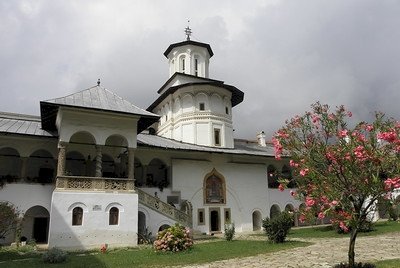
The Horezu Monastery is located about a 2-hour drive south of Sibiu, on the road to Targu Jiu. I hadn’t found much visitor information beforehand, so I just hoped it to be open on a Monday morning in late August. When I arrived there were only a couple of cars in the parking lot, and one single souvenir stall out of a row that was open. It’s not a site that appears to be visited by hordes of tourists, certainly not foreign ones.
You have to walk uphill to get to the monastery. The entrance is via a gate in the thick surrounding walls. You can just walk in, there’s no entrance fee and it does appear to be open every day (as it is an active nunnery). From the gate my attention was immediately drawn to the church in the center of the grounds: it is very white and a bit odd shaped (I had seen that already in pictures), and its front portal is completely covered by wall paintings. Clouds had been covering the sun for most of the morning, but fortunately, the sun came out now to brighten up my pictures of this very pretty site.
I slowly walked around in the enclosure, which isn't very large. Under the bell tower is a small refectory, almost like a cave. It holds a table and about 40 chairs, and its walls are completely covered in paintings. What a place to eat every day! The Last Supper …
Keep reading 0 comments
